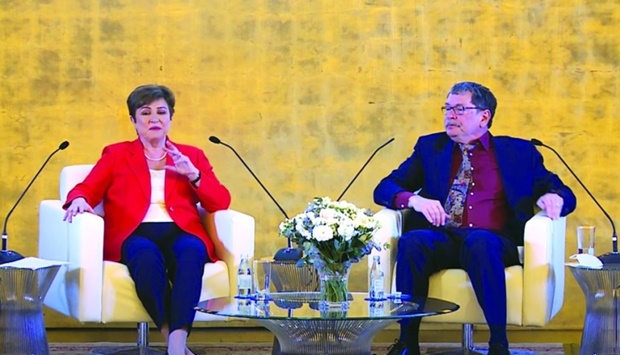The International Monetary Fund (IMF), which is appreciative of Qatar's efforts in Afghanistan evacuation, on Monday said the Middle East and North Africa (Mena) has to strengthen its access to finance for small and medium enterprises (SMEs) and create more jobs for the youth.
"The very youthful region, from the perspective of deploying young smart people, the first and foremost needs jobs for all of them. Unemployment among young people in the Mena region is 30%," IMF managing director Kristalina Georgieva told a roundtable discussion on 'Future of the Youth: Role of Education and Technology' with university students including from Qatar Foundation partner universities, Qatar University, and the Afghan Robotics Girls Team.
Expressing "concern" over the lack of access to finance for young people; she said at present, the region is better placed especially because of financial inclusion based on digitalisation and the pandemic is certainly helping to open up more channels for everybody to be part of the financial system.
But it is still much more difficult for young people to be recognised as credible entrepreneurs and more broadly for the SMEs, she added.
"As much as 96% of the SMEs in this (Mena) region are registered and they are the major contributors to the employment, 60% to the employment; but they only get 7% of financing. So obviously, this is where we as a financial institution, we work with our members in the region to try to change," the IMF chief said.
The average share of SMEs in total bank lending in MENAP and CCA countries is only about 7%, the lowest in the world. The IMF and other international institutions, therefore, have a key role in supporting the prioritisation of reforms and the design of policy strategies in a way that increases SME financial inclusion that is country-specific and build on international experience, said the Bretton Wood's research paper.
According to the World Bank Enterprise Survey, a comparatively high percentage of firms in the MENAP region (about 32%) report access to credit as a major constraint (compared with the world average of 26%). The percentage is lower in the CCA region (18%).
Highlighting that the world has become unequal, she said unfortunately during the pandemic, inequality within and across countries has grown and the greatest concern is that "the dangerous divergence" has happened over the last (few) years.
Georgieva said wealthy countries were able to support their people and business on a massive scale, providing 28% of their GDP (gross domestic product) in stimulus; whereas the middle income countries 6% and poor countries 2%.
The "dangerous divergence", she said, had led the poor countries becoming poorer, undermining the chances for stability, security and peace in the world.
On Afghanistan's decision to bar girls from education, she said "it is a tragedy" but added many are investing and Qatar deserves a great deal of praise because it is the country that has helped, more than anybody else, to evacuate Afghan people.
"The very youthful region, from the perspective of deploying young smart people, the first and foremost needs jobs for all of them. Unemployment among young people in the Mena region is 30%," IMF managing director Kristalina Georgieva told a roundtable discussion on 'Future of the Youth: Role of Education and Technology' with university students including from Qatar Foundation partner universities, Qatar University, and the Afghan Robotics Girls Team.
Expressing "concern" over the lack of access to finance for young people; she said at present, the region is better placed especially because of financial inclusion based on digitalisation and the pandemic is certainly helping to open up more channels for everybody to be part of the financial system.
But it is still much more difficult for young people to be recognised as credible entrepreneurs and more broadly for the SMEs, she added.
"As much as 96% of the SMEs in this (Mena) region are registered and they are the major contributors to the employment, 60% to the employment; but they only get 7% of financing. So obviously, this is where we as a financial institution, we work with our members in the region to try to change," the IMF chief said.
The average share of SMEs in total bank lending in MENAP and CCA countries is only about 7%, the lowest in the world. The IMF and other international institutions, therefore, have a key role in supporting the prioritisation of reforms and the design of policy strategies in a way that increases SME financial inclusion that is country-specific and build on international experience, said the Bretton Wood's research paper.
According to the World Bank Enterprise Survey, a comparatively high percentage of firms in the MENAP region (about 32%) report access to credit as a major constraint (compared with the world average of 26%). The percentage is lower in the CCA region (18%).
Highlighting that the world has become unequal, she said unfortunately during the pandemic, inequality within and across countries has grown and the greatest concern is that "the dangerous divergence" has happened over the last (few) years.
Georgieva said wealthy countries were able to support their people and business on a massive scale, providing 28% of their GDP (gross domestic product) in stimulus; whereas the middle income countries 6% and poor countries 2%.
The "dangerous divergence", she said, had led the poor countries becoming poorer, undermining the chances for stability, security and peace in the world.
On Afghanistan's decision to bar girls from education, she said "it is a tragedy" but added many are investing and Qatar deserves a great deal of praise because it is the country that has helped, more than anybody else, to evacuate Afghan people.


